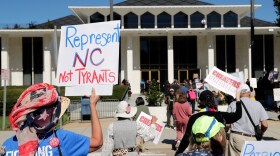North Carolina state Senate Republicans acted quickly on Tuesday to attempt to override Democratic Gov. Roy Cooper's recent vetoes on legislation addressing consumer loans, local government finances and state employee training and hiring.
The Senate voted separately for each of the four measures by margins just wide enough to enact them over Cooper's objections contained in his veto messages. Any or all of the bills will become law should the House also vote to override the vetoes by similar three-fifths majorities.
Republicans hold veto-proof majorities in the House and Senate for the first time since 2018 thanks to seat gains last fall and a party switch in April. The GOP used these margins last month to override on party-line votes Cooper's veto of a measure that starting July 1 bars most abortions after 12 weeks of pregnancy.
Each of the four bills acted upon by the Senate on Tuesday received some or overwhelming formal Democratic support before they were sent to Cooper's desk. The measure with the narrowest amount of bipartisan support at that time would ban the promotion of certain beliefs that some lawmakers have likened to critical race theory in state government workplaces.
The bill would bar trainers of these employees from promoting concepts such as “one race or sex is inherently superior to another race or sex,” or to believe they should feel guilty for past actions committed by people of the same race or sex.
It also would prohibit hiring managers for state agencies, community colleges and the University of North Carolina system from compelling a job applicant to opine about their personal or political beliefs as a condition of employment.
In his veto message last Friday, Cooper said the bill attempts to suppress productive workplace discussions related to diversity, equity and inclusion that can help workers understand the "unconscious bias we all bring to our work and our communities.” But bill supporters say the measure is truly about promoting diversity by refusing to require uniformity in belief.
Cooper vetoed the other three bills on Monday. They include two lending measures that in part would raise interest rates and late fees on certain amounts of personal consumer finance loans as well as on consumer credit sales — that's when the buyer purchases a vehicle or some other kind of product and pays it off in installments or with a finance charge.
Supporters of the finance bills said lenders are struggling with inflation that has increased the cost of providing important services to residents. But Cooper said North Carolina consumers can't afford these higher expenses when the cost of living is rising.
And the other vetoed bill would permit the state's Local Government Commission to order withheld a portion of sales tax revenues the state collects for cities and counties that fail to complete annual audits of their accounts. Such withholding, which could be equal to 150% of the auditing costs, has the support of State Treasurer Dale Folwell and State Auditor Beth Wood and others who say it would encourage government accountability. Cooper said the bill is well-intentioned but would likely hurt the state's smallest communities.







